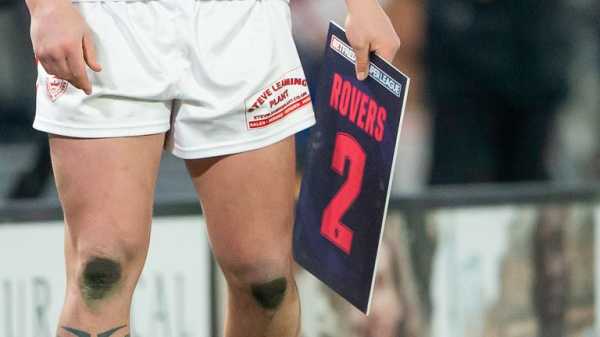
26:41 Hull KR head coach Tony Smith has urged the RFL not to rush any proposed rulechanges
In short, the ‘six again’ rule offers an advantage of additional tackles to the side in possession – although these do appear anecdotally thus far to be early in the tackle count – while also giving the defensive unit the chance to “rescue” a defensive set.
Relatively minor ruck infringements no longer necessarily mean you’re defending your own line.
Verdict: Bring it on.
Protecting the legs of standing ball-carrier
This is self-explanatory. Third defenders adding to a tackle now must make contact above the ball carriers knee joint.
Verdict: Yes. About time.
Removal of interchange reduction as a punishment

The intention of this rule, which was introduced without dissent ahead of the 2020 season, was to remove an administrative area of the game which was allegedly open to an element of gamesmanship – for want of a better word – for club coaches.
In 2019, a 19-man squad had to be declared 48 hours before kick-off. This could be changed on medical grounds and the feeling was that this was regularly abused to mislead the opposing camp.
This year’s iteration saw the squad to be declared increased to 21 – also 48 hours prior to kick off – on the proviso that any changes to this expanded declared squad after the submission deadline would incur the loss of an interchange.
Given the increased likelihood of forced changes upon the resumption of Super League, say, from high temperature readings returned by players within the 48-hour window, this appears to be another common-sense solution to a rule that could not have anticipated the effects of a global health pandemic.
Verdict: Yes, I agree, implement the change.
The removal of scrums

The concept and the practical mechanics of the scrum have taken on huge significance and increased focus since the advent of coronavirus.
It is the area of the game which, naturally, is of most concern the medical professionals advising the RFL when mitigating against the risk of virus transmission in our contact sport.
Say there are an average of 12 scrums a game, involving the binding and heavy-breathing of nearly half of the on-field playing personnel, for up to 25 seconds at a time.
One can see how this amount of time in close proximity has become a key issue when looking to the continued health of all players and, therefore, the continuation of the season once restarted. So, the argument and the proposal appear to be valid ones.
However, the scrum in league is sacrosanct to many. It is one of the central identifying tenets of the game. The problem is that the continuation of the scrum and the mitigation against virus transmission are increasingly seen in the current environment as mutually exclusive.
Perhaps it is not a case of we can’t afford to lose the scrum, rather can we afford to keep it – at least for now?
There is also a pretty cogent argument that the sport has evolved into a different beast from its traditional roots and has possibly outgrown the need for a scrum as a facilitator to restart play.
We have found very good ways of restarting play, already well-established in the game without the need for scrums – which, by the way, are 99 per cent uncontested anyway. We already have the handover rule which covers an error in possession on the last play, so why not extend to all tackles?

0:48 RFL CEO Ralph Rimmer comments on the likelihood of promotion and relegation to and from Super League in 2020
The counter-argument the scrum opens the field up for outside backs doesn’t appear to hold water in the modern game. Breaks by players and their filtering into the defensive line from the scrum are pretty efficient these days and, as a result, we see little to no exposure of this additional space on early plays from this traditional restart of play.
Does this temporary rule change, enforced due to unforeseen circumstances, offer the perfect opportunity to streamline the sport further? Time and experience with the sport without scrums in 2020 will give us the answer.
Verdict: We can’t afford not to implement. Then we can assess its impact at the end of the season.
So, some interesting times, and challenges, ahead for players and coaches. Whatever the sport looks like on its return, one thing is true: It will be great to be back.
Sourse: skysports.com






